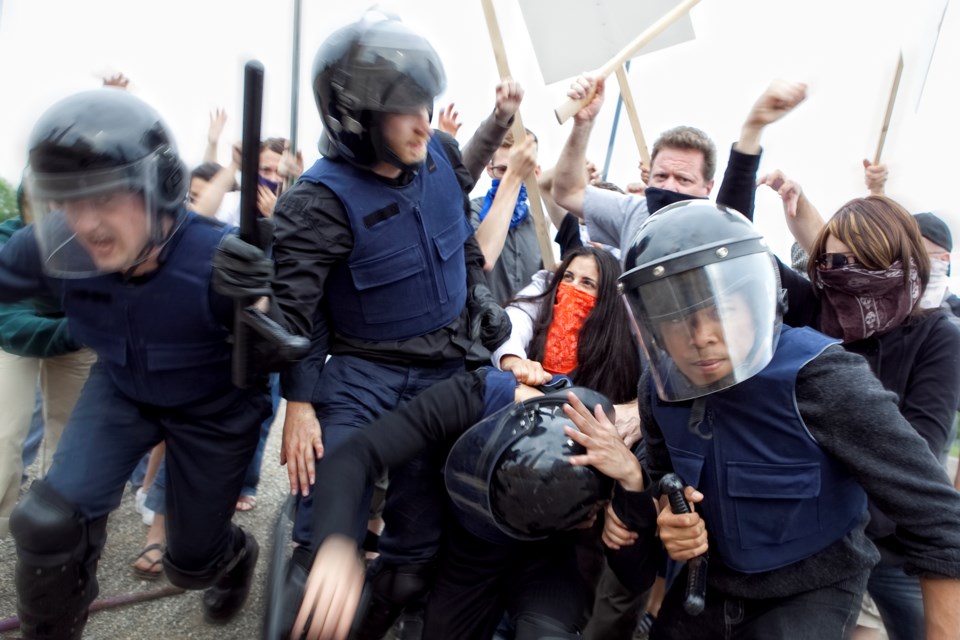While enacting the may clear our streets, the protests have revealed the foothold alt-right extremism has in Canada. The government response has been outmatched by internet-based misinformation, organization and recruitment.
For the last three weeks, we have watched radicalization happen in real time.
often begins with a person’s desire to belong, and belonging is cultivated around shared interests, fears and opportunities to feel heard. People then join a group by embracing the shared symbols and rhetoric — movements become radical extremism when people embrace personal attacks as a means to feel empowered at the expense of others.
Supporters of the “freedom convoy” have used COVID-19 vaccine mandates as a rallying cry and hatred has been used to empower and bind the movement together. Leaders of the movement are using to turn frustrations into .
The result: more than in Ottawa in three weeks.
While “freedom convoy” supporters may be a , social science has shown it only takes a .
To turn back the tides of radicalization and hate, Canada needs investments in our democratic culture, improvements in policing and support for grassroots efforts. We can look to international and local examples for practical solutions.
Invest in democratic culture
in the world, but our research at the ’s has shown that many people have a . Democracy feels disconnected from community and civic life.
To heal the rift, we can look to the Council of Europe for help. Their names a total of 20 critical understandings, values, attitudes and skills that people must cultivate in competent democracies. The framework also puts these ideas into practice for ministries of education and practitioners.
As part of its , the federal government needs to invest in a national effort to develop its own framework of democratic skills, attitudes and knowledge, immersed in truth and reconciliation and adapted to our particular form of immigration and multiculturalism.
We need a formal process for creating a national dialogue about the attitudes and behaviours we want in our democracy.
Invest in police reform
Canadians , but the protests have documented the truth: the law treats Canadians differently based on their skin colour.
RCMP are quickly militarized to push Indigenous people off their land when they , but police with the same vigour.
The hypocrisy of the last three weeks erodes trust in all our institutions.
To restore trust, the rest of Canada should follow Nova Scotia’s lead. Last month, Halifax released a list of to re-task police, reform practices and accountability to improve public safety.
All levels of government need to invest in similar commissions and, more importantly, enact their recommendations.
Invest in de-radicalization
The federal government may have a , and invested in countering misinformation through its , but they have yet to be scaled up effectively.
To shrink the foothold of alt-right fascism, we can look to Norway and Germany’s . These approaches model a national strategy that supports grassroots counselling and family support to help those leave radicalized groups.
They encourage people to build new productive relationships and promote trust among communities and institutions. They are hailed as one of the most successful de-radicalization strategies, and in Norway, their efforts are believed to have .
Effective grassroots programs exist in North America and can be scaled. uses support networks to help people move away from radicalization. In Canada, the works with communities to develop public education campaigns tailored to different extremist beliefs. These approaches also fulfil the need for community that often draws people to extremism in the first place.
Most de-radicalization approaches emphasize using dialogue: building empathy and exploring the values and motivations at the foundation of someone’s ideas.
It’s challenging to forcibly , but loved ones can , reduce and .
Invest in local democracy
If radicalization is tempting because it creates belonging and a sense of empowerment, we need to invest in democratic forms of those experiences in our own backyards.
Scotland, for example, has passed the . The act provides a fund to allow communities to tackle poverty on their own terms. It also creates community councils to elevate citizen voices in government and encourages deliberative activities to involve residents in solutions.
Canada often creates funding opportunities and programs to encourage solutions to important problems — it’s time to ensure those take place at national and local levels to promote democratic skills, belonging and empowerment. Proven solutions exist. We just need to invest in them.
Kelly Grounds co-authored this article. She has worked as a junior policy analyst in cybersecurity and as a research assistant on disinformation projects.
![]()
The Strengthening Canadian Democracy Initiative has received funding, in the past, from the Government of Canada's Digital Citizen Initiative. The SFU Morris J. Wosk Centre for Dialogue receives contracts from the government to engage citizens on important topics of deliberation.



